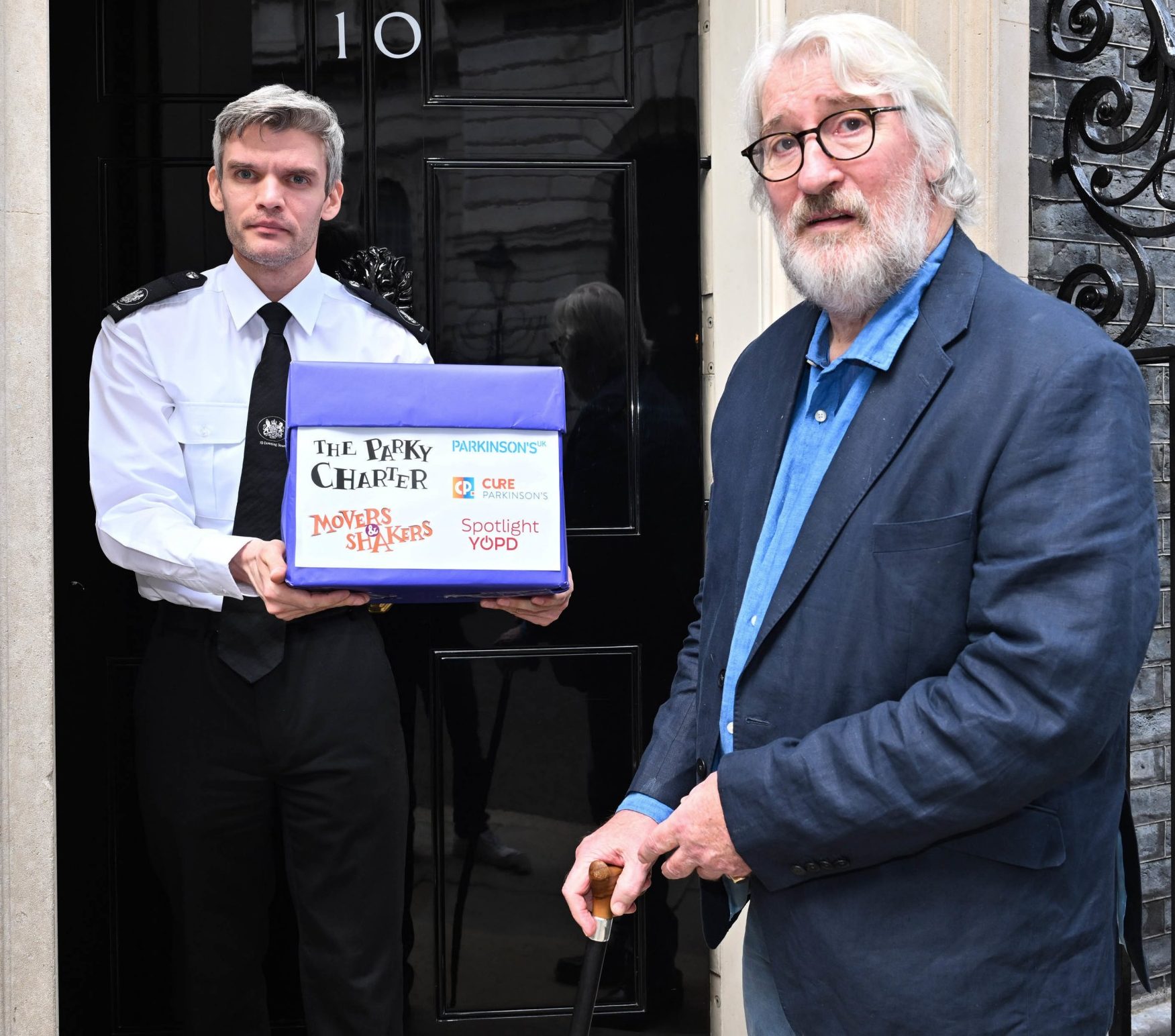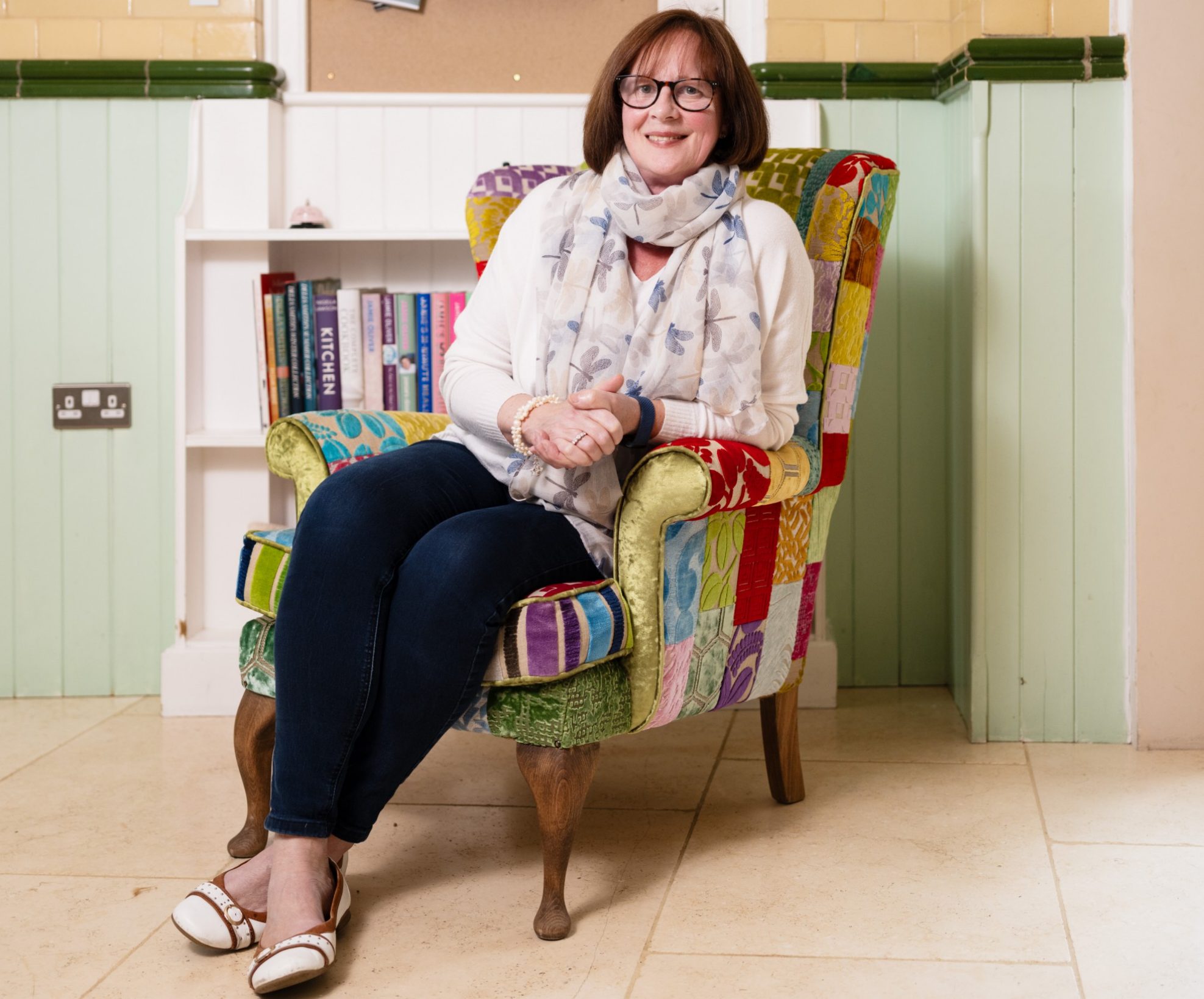
Jeremy Paxman and Sir Nicholas Mostyn mark World Parkinson’s Day at Downing Street, April 11 2024 – PA
For years, Newsnight and University Challenge presenter Jeremy Paxman has been famous for ruthlessly cutting to the chase. But last week, as he and a group of high-profile people with Parkinson’s disease headed to Downing Street to campaign for better treatment for those with the condition, his astute eye was at its saddest, and most brutal.
“Parkinson’s may not kill you,” he said, at the Downing Street event. “But it will make you wish you hadn’t been born.” For many sufferers – and their families – this assessment of the slowly progressing disease would have been devastatingly familiar.
Parkinson’s is the fastest growing neurological condition in the world. Over 150,000 people in the UK currently have it, but this is set to double by 2040, experts predict – largely due to our ageing population. And yet, as ex-BBC technology correspondent Rory Cellan-Jones (who was also at Downing Street) pointed out on a podcast earlier this week, Parkinson’s is often overlooked. “It feels a bit of a forgotten condition or an embarrassing condition,” he said.
Parkinson’s remains incurable partly because health professionals still don’t know what exactly triggers it. “The cause of Parkinson’s disease is multifactorial and, although there is consensus among experts that Parkinson’s is an age-related disease… we do not yet have clear answers,” suggested a Lancet article from January 2024. The disease varies greatly between individuals, with a wide range of symptoms and progression rates.
And yet, research into Parkinson’s is woefully underfunded. A Freedom of Information request by the charity Cure Parkinson’s showed that the Government had put just £6.7 million into Parkinson’s research in 2021/22, while the total cost of caring for people with Parkinson’s in the UK has been calculated at £728 million per year. In comparison, the Government invested £122 million into cancer research in 2022/23.
“The search for better solutions has been hampered by the limits of current understanding about the pathological mechanisms that underpin the signs and symptoms of Parkinson’s disease,” says Ray Chaudhuri, professor of neurology and movement disorders at King’s College Hospital and King’s College London and the medical director of the Parkinson Foundation International Centre of Excellence.
Sir Nicholas Mostyn, a former high court judge and top barrister best known for representing Paul McCartney in his divorce from Heather Mills, was diagnosed with Parkinson’s in May 2020. Mostyn agrees entirely with the assessment that the condition has been “forgotten”.
“The scale and scope of it is enormous,” he says. “Old and young people, male and female – people with the condition are ignored and misrepresented.” He believes that many feel isolated and unsupported by the state.
“When I was first diagnosed, what did I know about it?,” says Mostyn, 66, who alongside Paxman, Cellan-Jones and others presents the award-winning podcast about life with Parkinson’s, Movers and Shakers. “Like most people, I only knew about the tremor.”

Paxman is a co-host of the Movers and Shakers podcast, founded to raise awareness of Parkinson’s disease – PA
But 30 per cent of sufferers do not present with shakiness. “You can only see a small part of it: the shuffling, the falling and the tremor,” says Mostyn. “The most apt metaphor for symptoms is to compare Parkinson’s with an iceberg. What you can’t see is below the surface: the insomnia, the exhaustion, the mood issues, and the pain.”
Mostyn suffers from night terrors – in his opinion the very worst thing about his condition. “I have dreams that I am vanquishing evil invaders,” he says. “Two nights ago, I woke up bellowing: ‘how dare you insult my f—ing grandmother?’ to some imaginary alien.”
Nurse Claire Addison was 49 when she began to suffer a range of seemingly unconnected symptoms. “Around 10 years ago, I started to feel very fatigued,” she says. “Then, one day, I fell over the vacuum cleaner, even though I’m usually very coordinated. My shoulder continued to hurt, and I thought I had done something to the nerve – especially when my left arm started to shake.”
After a bout of dizziness, Addison went to her GP. “He wondered whether I was menopausal, whether I was drinking enough water,” she says.
It took two years before Addison was finally referred to a neurologist. Such a time delay is not uncommon. As Cellan-Jones said at the weekend: “We get so many letters about the delay in seeing a consultant for diagnosis, and then huge gaps between visits to a consultant… it’s just not good enough.”
Addison’s consultant neurologist performed a DAT (dopamine active transporter) brain scan, which identified her Parkinson’s.“It was… quite difficult,” says Addison. “The first consultant I saw told me I ‘had five years’ but didn’t specify what would happen at the end of the five years.” While still in shock, Addison was asked whether she wanted to take medication – without actually being given any advice about whether it was a good idea or not.

Addison’s tremor was eventually reduced with prescribed medication – Rii Schroer
“The diagnosis hit me hard,” she says. “I took to my bed in despair for four weeks, felt sick and stopped eating. It took a friend to come over and ask me what I was doing; what exactly had changed from four weeks ago. I knew she was right, so I got out of bed and walked down to the village fête with her.”
Once she had recovered her composure, Addison did research, took some advice, and changed consultants. “If there’s one thing I want people to know, it’s vital they feel confident in their medical team and they can choose their doctors,” she says.
Addison is now on an effective combination of treatments. “They reduced my mild tremor,” she says. “The only side-effect I have is swelling in my ankles. I realise I am lucky.”
Parkinson’s symptoms are caused by a lack of the neurotransmitter dopamine in the brain, and many treatments are aimed at either temporarily replenishing dopamine or mimicking its action.
For some, a “first choice” drug might be a form of levodopa, or another type of other drug known as a dopamine agonist.
But these drugs can have troubling side-effects in themselves. “Whenever I see my consultant, he asks me whether I’ve been watching pornography at night, or whether I’ve been busy buying Mercedes-Benzes,” says Mostyn. “One of his former patients bought 27 cars in a week. People with Parkinson’s often lack impulse control.”
Another treatment, deep brain stimulation, is becoming more well known but is very dependent on individual cases. Provisional figures from NHS England show that 373 people had the treatment in 2021/22. It involves inserting electrodes in the brain and can help reduce some of the symptoms and improve physical control.
Scientists also hope that the quest to find new treatments may have been accelerated by years after they used AI to analyse millions of chemicals to identify those that might halt the build-up of alpha-synuclein, the protein that plays a major role in the disease’s development. They have highlighted five which can now be tested for their effectiveness.
Chaudhuri, though, points out it’s not all about medicinal treatments.
“The drugs – if used judiciously – are actually pretty fantastic,’ he says. “But the answer doesn’t just lie in a lab.”
Chaudhuri points to “compelling evidence” that lifestyle factors can slow the disease’s progression. “A diet rich in olive oil, berries, and an avoidance of dairy,” he says. “I tell my patients they need six to eight hours’ sleep, as well as 150 minutes of physical exercise a week.” Exercise is said to promote the more natural production of dopamine.
Chaudhuri is also keen to draw attention to the plight of the families of people with Parkinson’s. “Many relationships break up, and carers are often more psychologically traumatised than the person who is ill,” he says.
Sylvia* – whose father had Parkinson’s in the early 2000s, can attest to that. “My dad would fall at least five times a day and his consultant would advise mum to just call the fire brigade,” she says. “It seemed like the consultant had never actually cared for a patient with Parkinson’s. There’s no one-size-fits-all care package, so nurses, doctors and carers need a lot of training to understand what best to do.”
Even if the training improves, there are still problems around finance and Mostyn points to shortcomings in the benefits system: “There needs to be fair treatment around PIP, or personal independence payments,” he says. “These are designed to help people live a normal life, but those awarding them can often make a mess of assessment. People with Parkinson’s aren’t going to get better but patients do need long-term awards with no need for constant reviews.”
In June, Mostyn and Chaudhuri will be spearheading the launch of a charitable fund called King’s Parkinson’s, part of King’s College London, aimed at helping all people with the illness.
“I prefer to see Parkinson’s not just as a single disease, but as a set of syndromes,” says Chaudhuri. “We need the medical profession to recognise that there are gaps in care, and that people need personalised strategies. There is no good treatment for pain, insomnia or apathy – which so many patients say is a fundamental problem.”
The aim is to introduce a “dashboard” of concerns – a checklist that every GP should follow: from bone health, to emotional health and gut health.
Mostyn also feels strongly that an all-over approach to care for those with Parkinson’s is needed. “My first neurologist told me there was a 20 per cent chance I would be in a wheelchair in five years’ time,” he says. “I preferred to concentrate on the 80 per cent chance.
“I have a personal trainer twice a week, play tennis, recently skied in Canada,” he says. And Addison does pilates, takes her dog for long daily walks and still works as a nurse for two days a week.
It all points to the importance of a patient having more control over their treatment. “I realise that I am fortunate in that I have sharp elbows, power and influence,” says Mostyn. “My care is the result of being a noisy and annoying person. Now it’s time for all people with Parkinson’s to avoid the delays and the indignities and receive a comprehensive plan.”
*Name has been changed
Recommended
Everything you need to know about Parkinson’s
Read more
Play The Telegraph’s brilliant range of Puzzles – and feel brighter every day. Train your brain and boost your mood with PlusWord, the Mini Crossword, the fearsome Killer Sudoku and even the classic Cryptic Crossword.
News Related-
Recall Just Announced For Popular Cookies Featured In Holiday Gift Baskets
-
Eagles rally past Bills in overtime as Chiefs win
-
Reality bites the green energy agenda
-
Sandigan orders Marcos Sr. pal to pay workers
-
DSWD: Shear line, LPA affect 1.2 million people; over 18,000 families evacuated
-
The mayor of Paris is making a loud exit from X, calling the platform a 'gigantic global sewer'
-
Rain showers, thunderstorms over Luzon, including Metro Manila — Pagasa
-
'Naruto' live-action film adaptation is in the works
-
NASA Highlights Stingray Nebula
-
Manila's Lagusnilad underpass opens
-
China probes debt-ridden financial giant
-
China's VUCA situation
-
Unraveling the mystery that is diabetes
-
Bangladesh's nuke plant is not going to steal PH investments
